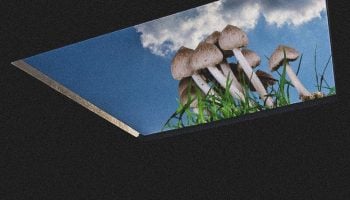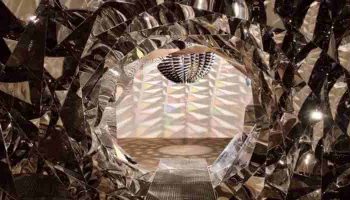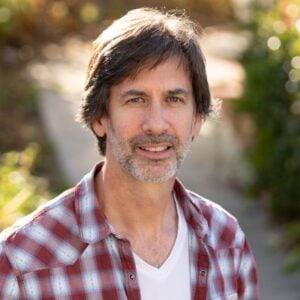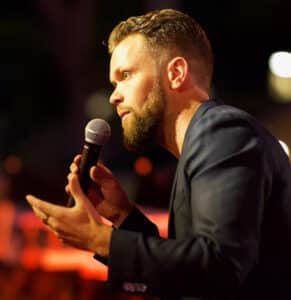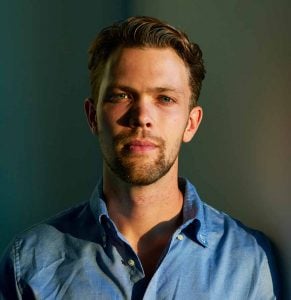Listen to our interview with Idahosa on The Third Wave Podcast!
After years of exploring and innovating, Idahosa Ness is doing something new: staying put and expanding.
Now based in Lisbon, Portugal, Ness spent nearly seven years traveling the globe. Originally from Harrisburg, PA, he took off after graduating from Georgetown University, never staying in one country for more than a few months. In 2012, he launched his company, the Mimic Method.
The Mimic Method is a unique program that teaches people to learn foreign languages using mimicking and phonetic techniques. The idea is based on Ness’s experience with percussion in South America, applied to linguistics. Today the Mimic Method boasts 4,000 customers and an email list with more than 30,000 addresses.
Ness’s business has allowed him to live as a digital nomad: Since his product resides online, he could work from virtually anywhere in the world. The same went for anyone he hired remotely to help Mimic Method grow.
Now, however, Ness is ready to settle, at least for a little while. His decision to set up in Portugal for the foreseeable future comes from him recognizing the potential to expand his business. It’s also informed by his recent experiences with LSD and psilocybin mushrooms — “new tools in his arsenal,” as he calls them, to address his personal and professional goals.
“My default personality is exploration, which is great, it’s how I got here,” said Ness. “But I hit a wall where what I needed is not more innovation, but to stick to these ideas and see them through.”
Idahosa Ness, founder of The Mimic Method
Even before college, Ness knew he’d live an unconventional lifestyle. He remembers understanding the “rat race” concept by the end of elementary school. Later, he became disdainful of the common warning to live it up in college since life was downhill from there.
“I didn’t want to peak at 22. During senior year [of college], my friends were looking to go into prestigious jobs or graduate programs,” recalled Ness. “I did neither. I worked to go to Brazil.”
Once there, he began learning different musical instruments and settled into a samba group that taught percussion. Ness played the violin as a kid, but wasn’t at all familiar with the rhythms and patterns of Brazilian music.
“I wanted to perform, but I couldn’t get the beats right,” he admitted.
So he took their written music home to study and practice. Then, he began thinking of rhythms as pronunciation. Instead of drum hits, Ness imagined each small sequence as a syllable with a different articulation.
“That was the main awakening moment,” he recalled. Ness quickly picked up those rhythms, then considered how this applied to learning languages, and began researching linguistic theories. Two years later, the Mimic Method was born.
Listen to our interview with Idahosa on The Psychedelia Podcast.
He designed the company with a lifestyle intent: Ness could promote and deliver his digital product online from anywhere while exploring new places around the globe. After a few years, however, he began to want more.
Aware of the Mimic Method’s potential, Ness decided to expand his business. After attending conferences, plugging into business networks and researching entrepreneurship skills and tactics, he hired his first remote employee, then another and another.
Soon, he thought less about traveling and learning, and more about digital structures and workflow systems. It began to make more sense for Ness to settle down somewhere, at least for a while, and concentrate more on the business.
The decision coincided with his introduction to psychedelics. Last summer, he began experimenting with microdosing LSD and took his first full trip in January. As a person who meditates regularly, Ness found psychedelics the other side of the coin to that practice.
Both bring him a sense of clarity, he says: “Friendly reminders” of his values, and that identifying too much with “made up drama” can lead to feeling depressed.
“At the end of these, I feel the calm that’s similar to what I feel from meditating after 40 minutes,” he offers.
What happens before that calm, however, is notably different on psychedelics than when he meditates.
“I’m someone with a lot of thoughts all the time. There’s a flurry of thoughts when I wake up. I’ll get over excited or overstimulated. When I meditate, it’s turning down the volume, more of a focus,” Ness explained.
The opposite happens with psychedelics.
“It felt like a more enhanced version of everything I think,” he said of his first trip. In general, “I have thoughts or ideas that are accelerated when I’m on LSD, but they’re things I would have gotten to in a few months.”
He describes tripping on mushrooms, “just seeing the whole cosmic drama play out,” on a beach in Europe, and being mindful of how psychedelics make him feel.
“They energize and invigorate me,” he said. “They turn up the volume.”
It’s more than just seeing the big picture, however. Especially for Ness’s line of work, just as important is the ability to see around, underneath and through it. The more he experimented with microdosing, and marijuana, in regular regiments, the more he saw how each one affected his thinking.
When it came to marijuana, for instance, he often can initially conceive, or clearly define, ideas or businesses strategies. The main takeaway from a full dose of LSD could often be a “novel thought” or simply a new idea that seems promising.
As someone who considers himself a teacher, and whose profession is linguistics, being in an altered state makes him think differently about how people communicate — the bedrock, essentially, of his business.
“Thinking about the dynamics of conversation, and society and culture, when people are talking, there’s this web of context beneath what they say,” Ness explained.
When using psychedelics, “These realities become very clear, and I can see them, almost visualize them. That’s been my role, my type of talent: Just seeing all the things people take for granted. When you see that, you can shift things around for making your own realities. That’s my key to invent products or systems.”
Ness is the first to admit it took him a long time to finally experiment with psychedelics. Now that he has, however, he sees them as a perfect fit for his existing mindset, and especially the way he approaches his work.
“In general, I’m an educator and the main source, the driving thing of what I do, is try to get people to think about stuff differently,” he said. “That’s what LSD does: Get people to think differently.”

